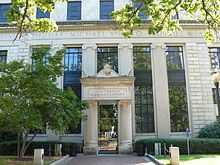Birmingham Public Library
For the main library in Birmingham, England see, Birmingham Central Library.
| Established | 1886 |
|---|---|
| Location | Birmingham, AL |
| Branches | 20 |
| Access and use | |
| Circulation | 1,651,488[1] |
| Other information | |
| Budget | FY 2008-2009 $16,689,860[1] |
| Director | Renee Blalock[2] |
| Staff | 300[3] |
| Website | http://www.bplonline.org |
The Birmingham Public Library, a well-respected and one of the largest library systems in the southeastern United States, consists of 19 branches and a main or central library located in downtown Birmingham, Alabama. The main library is composed of two buildings, the East Building, with its dramatic atrium, and the Linn-Henley Research Library, with its fine wall murals, the Tutwiler Collection of Southern History, and the Rucker Agee Map Collection.
History
The Birmingham Public Library was established in 1886 as an adjunct of Birmingham's public schools. John H. Phillips, then superintendent of the public school system, set up a library in a room not much bigger than a closet. In 1913, a public library board was established, and the City of Birmingham assumed responsibility for funding the growing institution.
The library was later moved to City Hall, where the collection burned in a fire in 1925. An impressive neo-classical building of Indiana limestone was completed in 1927 and served as the central facility of the Birmingham Public Library for 57 years. The city's library system was desegregated in April 1963, in part because of a lawsuit filed by the Alabama Christian Movement for Human Rights on behalf of Joe and Lola Hendricks.
To accommodate the growing collection and demand for services, an additional structure containing 133,000 square feet (12,400 m2) of floor space was completed in 1984 and connected to the original building via a crosswalk. This building houses most of the Central Library's circulating and general reference collections, plus the technical services for the library system.
The original 1927 building was renovated in 1985 and renamed the Linn-Henley Research Library. This facility houses the library's special collections, and government publications. Together these two buildings comprise the Central Library of the Birmingham Public Library system.


In addition to the Central Library, the Birmingham Public Library system includes 20 branches located elsewhere in the city. This branch system was begun when the Birmingham library began to integrate libraries from independent communities that gradually became incorporated into Birmingham. In the 1980s the library board had adopted plans to build regional libraries that would serve large sections of the city, would have larger collections and facilities, and would be opened more hours.
Over the years, it has matured and today serves a populace diverse in interests, needs, and age. Scholars and other researchers are drawn to the archival materials, the extensive genealogical materials, and the local and southern history resources, while students and other citizens expect current and broad-based reference information, up-to-date popular materials and innovative online services.
Annual circulation of roughly 1.7 million checkouts is matched by an equal number of materials being used within the libraries and via electronic access. Birmingham Public Library accounts for 46% of the circulation in the Jefferson County Library Cooperative, which posts a combined circulation of almost 3.7 million items checked out annually. The cooperative agreement that Birmingham Public Library shares with the other municipal public libraries of Jefferson County Alabama greatly increases the number of library materials available to all library members. In fact, the Jefferson County Library Cooperative is a model for how separate governments can work together to provide a public service across city boundaries.
Major collections and services
Tutwiler Collection of Southern History and Literature, listed as one of the top 10 public library collections for genealogists by Family Tree Magazine, is a collection that covers every facet of Southern life and culture. If you are interested in Alabama or Southern regional history, arts and sciences, geography, genealogy, or folklore you can find information on all these subjects in the Tutwiler Collection. There are extensive newspaper clipping files on local and regional history that can be searched for information along with periodicals and online databases. Other collections of note included are the Caribbean Collection, the Rucker Agee Map Collection, and the Rare Book Collection of early Americana.
In 2006, Digital Collections was initiated to preserve and make available the local history of Birmingham and the surrounding area.
Virtual Library Services via the Internet include online databases, eBooks and downloadable audiobooks, Ask A Librarian, blogs and RSS feeds and other Internet resources.
Public Computing Services include public access computers at all locations and free wireless access to the Internet via Wi-Fi available at the Central Library, Avondale Branch, Five Points West Branch, North Birmingham Branch, Springville Road Branch and West End Branch.
Library events
Alabama Bound is an annual book and author fair that celebrates Alabama authors and publishers. Hosted by the Birmingham Public Library, it is a meeting place where fans may meet their favorite authors, buy their books and hear them read from and talk about their work. Book signings follow each presentation.
References
- ↑ 1.0 1.1 "Annual Report Statistics 2008-2009". The Birmingham Public Library. 9 March 2010. Retrieved 3 March 2012.
- ↑ André Natta (2009). "irene blalock named new bpl director". The Terminal. Retrieved 28 May 2009.
- ↑ Mayor's Office (2007). "Mayor's Proposed Operating Budget Fiscal Year 2008" (PDF). City of Birmingham, AL. p. 56. Archived from the original on 2007-09-28. Retrieved 7 September 2007.
External links
- Birmingham Public Library
- Birmingham Public Library Digital Collections
- Birmingham Public Library's Latest News, Reviews & Info
- Birmingham Public Library photos on Flickr
- Birmingham Public Library videos on YouTube
- Birmingham Public Library on MySpace
Coordinates: 33°31′14″N 86°48′27″W / 33.520418°N 86.807434°W